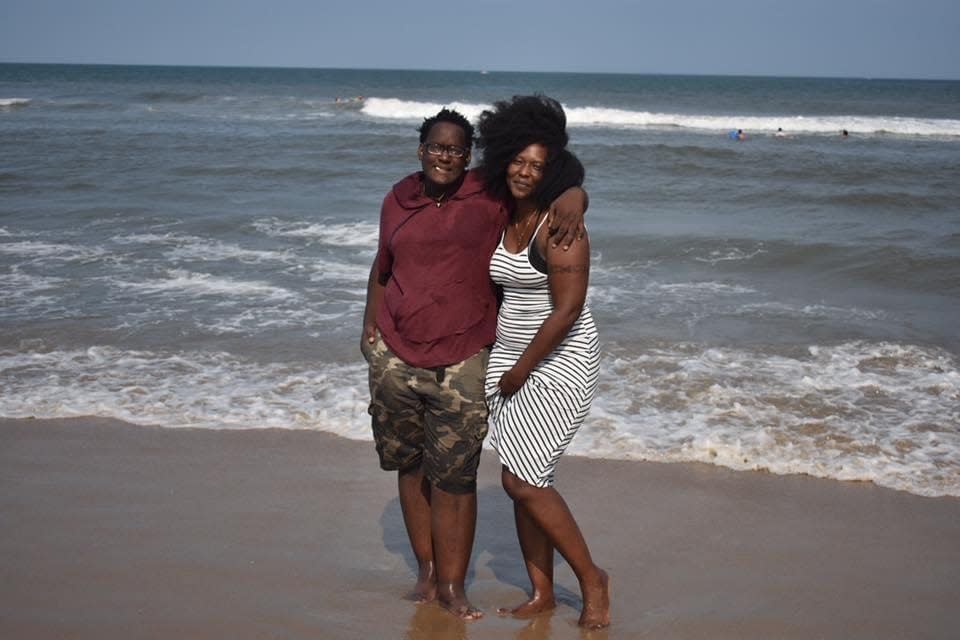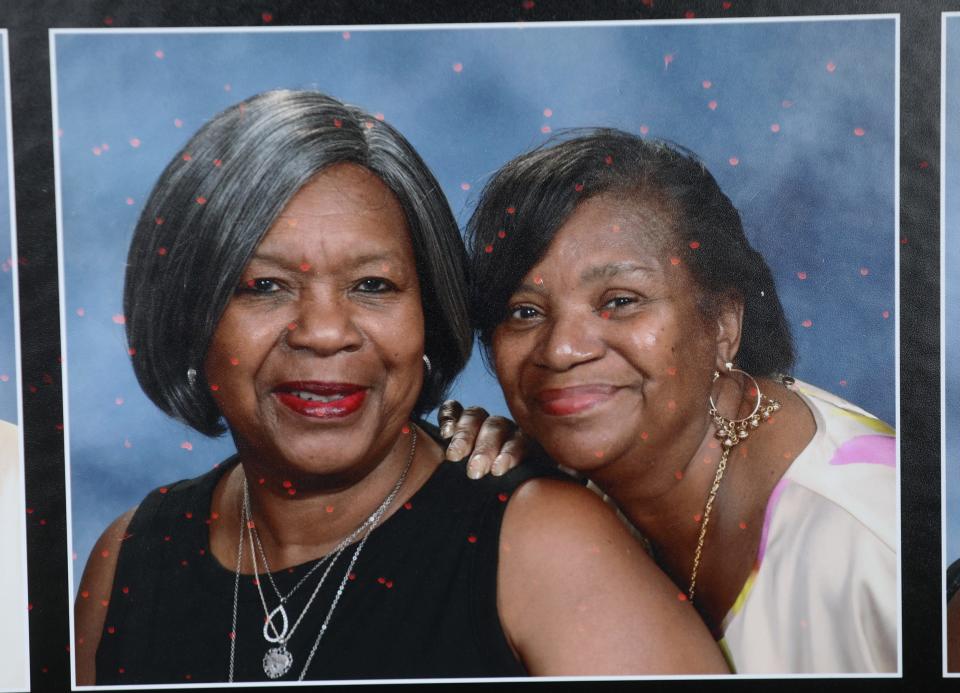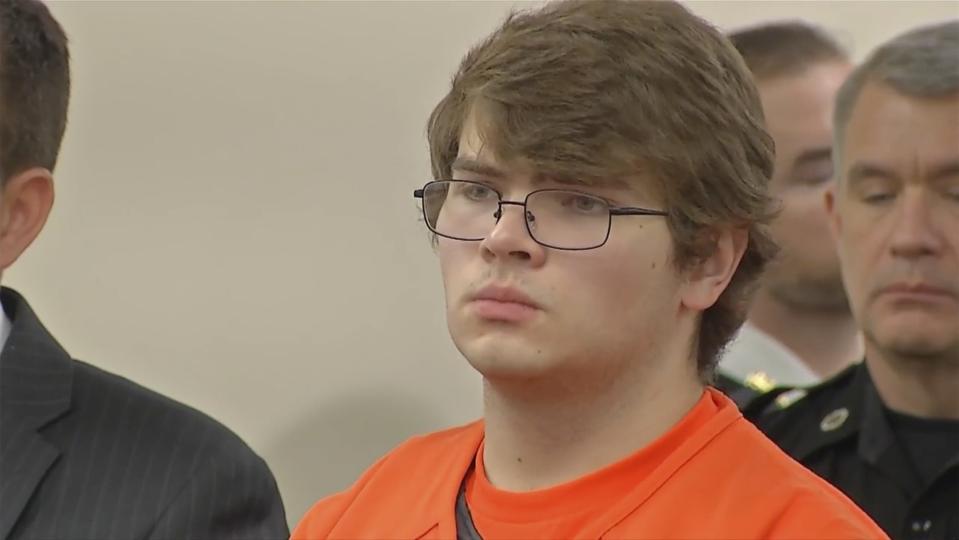Buffalo racist massacre puts death penalty in spotlight
"The ideology (with) which this terrorist carried out this attack by some is labeled as a sickness or a disease. It is not. Racism, hatred and white supremacy are lifestyles that are chosen."
— Zeneta Everhart, whose son was wounded in May 2022 Buffalo mass shooting, at February state sentencing of killer Payton Gendron.
Should Payton Gendron be executed for his racist massacre of 10 Black people last year at a Buffalo supermarket?
Should he be strapped to a gurney and a fatal chemical cocktail pumped into his veins, shutting down his heart? Or should he spend the remainder of his life behind bars with no opportunity for freedom? It would likely be decades; he is now only 20 years old.
Locally, the decision is being closely monitored by those who suffered the most — the families of the murdered victims.

"The victims in this case will have differing views on this issue," the defense lawyers for Gendron wrote in court papers. "Some may support a capital prosecution. Others may, instead, prefer the criminal case to be resolved expeditiously with a sentence of life without parole while they pursue civil remedies to bring accountability to others."
The decision also has the keen interest of individuals who monitor our country's use of the death penalty. The choice of whether to kill Gendron or let him live could have political implications, especially with a presidential election approaching and a Justice Department that has not mapped out a clear stance on federal executions.
"You just can't predict (the decision)," said local defense lawyer William Easton. Easton has navigated the waters before, handling federal death penalty cases across New York.
"There are too many political factors and also internal factors at the Department of Justice," Easton said.

For Gendron and his lawyers, a Sept. 18 meeting with Department of Justice officials could be key toward determining what route the federal prosecution of Gendron takes. While the meeting may not be the last, in recent years a Department of Justice decision has come within months afterward in other criminal cases.
At the Sept. 18 meeting defense lawyers are likely to highlight why they think Gendron's life should be spared and he instead should be sentenced to life without parole — a sentence he has already received for a plea in state court in Buffalo to 10 murders. They are likely to stress the social media and online platforms he traveled, where his racism appears to have been fostered and violently radicalized.
"Right now (Gendron) is not a danger to anyone," said Buffalo lawyer John Elmore, who represents some of the victim families in a civil lawsuit against online platforms where Gendron joined other racists and where he outlined his plans for violence. The families have also targeted those who sold and distributed the semiautomatic rifle and body armor used by Gendron.
Were it not for social media, Elmore contended, Gendron's intolerance may not have violently exploded.
"The dangers are the social media platforms that are allowing this hate speech and radicalization-type of speech," Elmore said.

Presidential politics connected to death penalty usage
"I don't wish the death penalty on you. I wish they keep you alive so you have to suffer with the thought of what you did for the rest of your life. To me, killing you is the easy way out."
— Wayne Jones, the son of murder victim Celestine Chaney, at the Gendron state sentencing.
President Joseph Biden came to office opposed to the death penalty after his predecessor, Donald Trump, oversaw a spate of federal executions at a previously unmatched pace. The Biden administration, however, has not intervened with cases that began in previous administrations and were eligible for the death penalty. Nor has the administration designated any new cases as eligible for capital punishment.

"I would hope that the decision is made based on all of the appropriate factors that can and should be considered based on (Justice Department) policies and guidance and not based on any political overlay," said Miriam Krinsky, a former federal prosecutor who heads the nonprofit Fair and Just Prosecution, which promotes equity and fairness in prosecutions.
"The second thing I would hope is that we would see the president stand behind what he said in the campaign that led to his election to office — that we should end the federal death penalty."
Among those watching for the decision, and what it reveals about the state of the federal death penalty, is the Rev. Sharon Risher. Risher's mother, Ethel Lance, was one of the nine Black people gunned down in a Charleston, South Carolina church by a 21-year-old racist neo-Nazi, Dylann Roof, in 2015.
Roof has been sentenced to die in South Carolina. Throughout his trial, Risher wrote notes to herself to help maintain calm. One read, "I hate hearing his voice." Sitting within 15 feet of Roof, she found herself wondering, "What is in this little boy’s soul?" she later told Elle magazine.
In a stance that has created schisms within her own family, including with her daughter, Risher is now a staunch death penalty opponent.
"In the beginning I was kind of like everybody else — the person who commits the most heinous crime should die," Risher said in a telephone interview. She saw Roof as "pure evil."
At first she supported capital punishment. She later had a change of heart because of her Christian faith and her recognition of past inequities, she said.
"I started to realize that we can't pick and choose (whom to execute). Can you imagine being in a cell for the rest of your life? That is suffering to me. I don’t want you to die. I don’t want you to get an easy way out."
Public support waning for capital punishment
"Your life was meaningless before May 14th, 2022, and you woke up every day feeling small. You clearly did not value your own life, which allowed you to devalue the lives of others. Even with all of the heartache that you have caused, you still have failed to break our family spirit. You thought you broke us, but you awoke us."
— Simone Crawley, granddaughter of Buffalo massacre victim Ruth Whitfield, at state sentencing of Payton Gendron.
The history of capital punishment in the United States includes the executions of individuals who were likely innocent and, as studies cited by the Death Penalty Information Center show, the inequitable treatment of Black people when compared with white people accused of similar crimes. In the U.S., 23 states and the District of Columbia now prohibit the death penalty.
The public support for the death penalty has significantly declined in the last 30 years, but recent Gallup polling shows about 55 percent of the public support the death penalty for convicted murderers. (If given the choice, 60 percent choose life without parole over execution.)
Still, as Gallup demonstrates, a majority do support capital punishment for killers, and there is no question of Gendron's culpability with the Buffalo murders.
He recorded himself live during the assault, as if the central character in a violent video game, and has admitted his guilt in state court. Erie County Sheriff John Garcia told the Buffalo News that he has encouraged federal prosecutors to seek the death penalty.
“As I have said since the day this crime was committed, this was an act of pure evil,” Garcia told the Buffalo News earlier this year. “This was a racist crime that involved extreme planning. He drove here from 200 miles away, scouted out the location. Then he put the whole crime on the internet for all the world to see.
“As far as I’m concerned, if you don’t use the death penalty in this case, when would you ever use it?"
That is the question now confronting federal prosecutors: When, if ever, is execution the proper punishment?
In July 2021 U.S. Attorney General Merrick Garland imposed a moratorium on federal executions:
The moratorium includes a study of capital punishment and how it has been administered within the federal system.
The findings of that study may dictate the immediate future of capital punishment as a choice within the federal courts, said Robin Maher, the executive director of the nonprofit Death Penalty Information Center, which produces research on the death penalty.
While the Biden administration has allowed some previously approved death penalty cases to go forward, "they have not authorized a (new) case," Maher said.
Pittsburgh and Buffalo hate crimes prosecuted
"I pray to God for your soul. I forgive you, but I forgive you not for your sake but for mine and for thisBlack community. I forgive you because that's the only way we gonna heal. But you can best believe, I will never forget your name. I will follow you ... your parole, whenever you in court, whatever you're goingthrough, I'm going to follow you."
— Brian Talley, brother-in-law of Buffalo murder victim Geraldine Talley, at Gendron state sentencing.
Prosecutors and Gendron's lawyers were in federal court last month to update a federal judge about progress with the prosecution of Gendron. That same afternoon a federal jury 200 miles away in Pittsburgh ruled that Robert Bowers, the man who gunned down 11 worshippers at the Pittsburgh Tree of Life synagogue in 2018, should be executed for his crimes. The Biden administration did not impede the capital punishment prosecution.

There are obvious parallels between the two crimes, most prominently the hate that served as the motivational undergirding for the murders — the racism with Gendron, the antisemitism with Bowers. Bowers was found guilty of federal hate crimes; Gendron is charged in federal court with hate crimes and, in his earlier guilty plea to state crimes, he admitted that his murders were driven by racist bile.
Both men carried out their massacres at community hubs — Bowers targeting Jewish victims, including Holocaust survivors, at a place of worship; Gendron choosing a popular Tops supermarket in a neighborhood he knew to be mostly Black in population.
There are also differences.
"One is the influence of social media on this kid," Rochester-based lawyer Easton said of Gendron. "How could this young man go out there and lose his mind to the hatred? To thoroughly explore that, wouldn't you like to have the defendant reveal what happened?"
The civil suits are targeting the social media operations that allowed Gendron a voice and a platform. The litigation has created an unusual alliance: Gendron's defense lawyers and attorneys representing the victims' families.
Gendron's defense lawyers want to be able to copy and share some evidence with the civil lawyers for the lawsuits, while prosecutors have maintained that there can be no copying of the materials and there should be other limits on what can be shared.
"I'm disappointed that the federal government has not turned over to us evidence that would move the litigation onward, knowing that Gendron's lawyers have consented to it," Elmore said. "Even Gendron's parents have consented to it and we're suing them."
Prosecutors say the criminal case is of foremost importance to them now and, while sympathetic to the families, they are wary of releasing information that could impact witnesses or the case.
The federal prosecutors have acknowledged that the opinions of the victims' families will be a factor in the decision over the death penalty, but just one factor.
"While the Department of Justice may — and here fully intends to — consider the views of the victims’ family members on seeking the death penalty during this internal process, their opinions are one of many factors that will be taken into consideration, and those views are not dispositive," federal prosecutors wrote in recent court papers.
Attorney General Garland will be the arbiter of Gendron's fate. If the case is deemed eligible for the death penalty, there would be a trial. The jury, if it convicts Gendron, would also determine whether he should be executed.
If the Justice Department decides against capital punishment as an option, Gendron will plead guilty. If it does not, the trial will commence, possibly in 2024.
"As humans, we have the ability to decipher right from wrong and make choices accordingly," Zeneta Everhart said at Gendron's state sentencing.
"No matter what choice we make, we have to deal with the consequences of that choice, good, bad or indifferent."
— Gary Craig is a veteran reporter with the Democrat and Chronicle, covering courts and crime and more. You can reach Craig at gcraig@rocheste.gannett.com. He is the author of two books, including "Seven Million: A Cop, a Priest, a Soldier for the IRA, and the Still-Unsolved Rochester Brink's Heist."
This article originally appeared on Rochester Democrat and Chronicle: Should Payton Gendron face death penalty for Buffalo Tops massacre?

